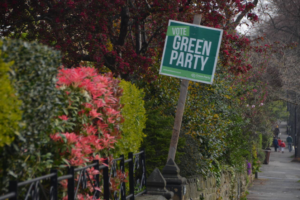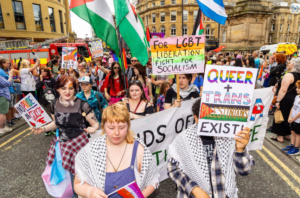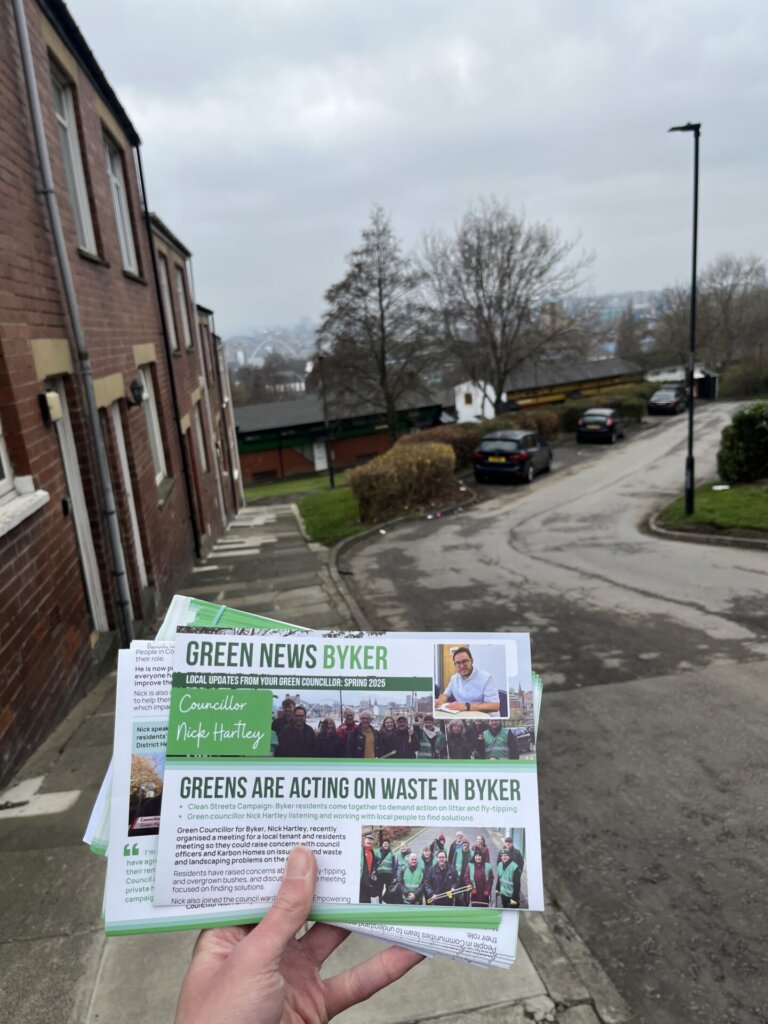Labour’s Moral Compass: Has the Party Lost Its Way?
Written by Kai Palmer on 22nd November 2024
Labour has long been the dominant political force in Newcastle and much of the North East, holding firm for nearly a century. Since 1923, Newcastle Upon Tyne Central has only elected Conservative MPs on three occasions, underlining Labour’s enduring stronghold in the region.
However, the May local elections signaled a potential shift in the political landscape. Byker and Elswick ousted their Labour councillors in favor of Green Party candidates, with Nick Hartley and Khaled Musharraf becoming the city’s first-ever Green councillors.
While this change may reflect a growing climate consciousness among voters, it also raises questions about Labour’s ability to connect with everyday people in the city.

Image Credit: Alamy
Aside from climate-friendly policies, the Green Party’s 2024 manifesto have pledged the following:
- Keep the NHS publicly funded and not-for-profit (Labour Health Secretary Wes Streeting branded those opposed to NHS privatisation as ‘middle-class lefties’ whilst accepting £175,000 from private healthcare donors).
- Scrapping tuition fees and restoring higher education grants. (Labour recently announced a tuition fee rise although despite Angela Rayner pledging to scrap them in 2019).
- Introducing a maximum 10:1 pay ratio within organisations to help close pay gaps between bosses and employees (Whilst Ofgem have recently announced a rise in the energy price cap to allow energy companies to make a “small profit”).

A Green Party election poster surrounded by trees and flowers in a suburban garden in 2019 in the city of Sheffield, England, UK. Andrew Tryon / Alamy Stock Photo
These are the type policies of a moral-standard that many would expect from a socialist party, and are an example of some that would bolster opportunities for ordinary people in a city like Newcastle, a city which traditionally housed a large working class population.
Whilst the term “working class” is now more archaic, the livelihood of normal, working people on low incomes remains just as challenging. 23% of people in Newcastle live in the 10% most deprived areas nationally, around 118,00 North East children are living in poverty, and attempt to find enjoyment via accessible, recreational opportunities can still be hard to come by: Newcastle’s arts and culture sector has been progressively underfunded for years.
Labour’s recent decisions
The new Labour government announced an end to winter fuel payments for many pensioners, and any such benefits will now be means tested. More recently, Newcastle City Council debated whether to stop providing school dinners, and seven Labour MP’s were suspended in July for voting against Keir Starmer’s refusal to lift the two-child benefit cap.
When asked about the government’s recent decisions, Nick Hartley, Byker Green Party Councillor said: ‘The government has chosen to continue a culture war that does nothing to solve the real global challenges harming peace and the climate, and nothing to fix the NHS or repair the harm from cuts to local authority budgets. No wonder the Green Party is on the rise, now with over 800 councillors in England and Wales and with representatives standing right across their communities calling for a fairer and more inclusive politics”.
Hartley also commented on Newcastle City Council’s school dinner debate, comparing it with Rachel Reeves’ decision to rule out a “wealth tax on the multi-millionaires and billionaires.”
“Major Sleaze” hypocrisy
This comparison reinforces the notion that Labour are no longer prioritising what was once their core voter base: which certainly wasn’t multi-millionaires or billionaires. They seem content with being a party that makes decisions that fail to benefit ordinary people. Rather than taking even more away from those already underprivileged, Labour could retrieve the money that was syphoned away by the Tories in the form of billion-pound dodgy PPE contracts and use that to help fund public services.
This disregard for the Labour party’s former morals seems to be descending from the top of the government: In 2021, Starmer attacked then Prime Minister Boris Johnson, calling him “Major Sleaze” after questioning how Johnson funded an expensive Number 11 refurbishment. This year, information came to light which revealed Starmer had accepted £76,000 worth of freebies in the form of tickets, clothes and more. The hypocrisy is rife.
Alex, 30, who lives in Newcastle and has always voted Labour in general elections, was asked whether or not she believes Labour are fulfilling their duty as the “traditional” party of Newcastle. Alex said: “Not at all, they are not a left wing party. When Labour was a socialist party it represented the workers, since Newcastle upon Tyne is traditionally a working class area”.
Anti-gay voting record
Alex also said that she does not feel her MP, Mary Glindon, represents her as “she does not support LGBTQ rights”. Two other Newcastle residents and long-time Labour voters also expressed their distaste for Glindon. Joe, 32, said they want “a different MP who supports LGBTQ+ rights”. Similarly, Sam, 37, said: “Politics is meant to be secular and she does not represent me or the people in my life.”

Mary Glindon during a photocall for Labour MP’s at The House of Commons, Westminster. PA Images / Alamy Stock Photo. Photographer: John Stilwell.
Green councillor, Hartley, said: “Questions have gone unanswered by Labour’s now MP for Newcastle East and Wallsend over her voting record against equal gay and trans rights”. Glindon was unavailable for comment, nor has she publicly addressed her constituents’ concerns about her anti-gay stance, but she was one of 151 MPs to oppose the legalisation of gay marriage and even signed a letter to the government, telling them that they had no right to redefine marriage.
“I still believe that Labour is a well-placed party to represent Newcastle…”
Daniel Hay, Treasurer for Newcastle University’s Labour Society, said: “On a local level, I still believe that Labour is a well-placed party to represent Newcastle. Any cuts to public services that Newcastle City Council has made have been forced on them, as a result of cuts to local government funding from successive governments in Westminster. Overall I think that Labour has been a force for good in Newcastle, and that the future of the city looks positive, with substantial investment going into the city which can be seen in a range of developments currently in progress.”
Hay, while affirming that Labour remains the best party for Newcastle, criticized the government for failing to demonstrate stronger moral principles than their Tory predecessors. He highlighted their refusal to abolish the two-child benefit cap—leaving “hundreds of thousands of children in poverty”—as evidence of misplaced priorities. Instead of taxing the rich to address the “black hole” in public finances and lift children out of poverty, Labour appears to have faltered in its commitment to social justice.
Hay further argued that the freebies scandal has undermined Labour’s credibility as a “changed” government dedicated to public service. The scandal, he suggested, has not only eroded public trust in politicians and politics but also revealed striking hypocrisy. “It’s especially damaging,” he said, “given how central integrity was to their campaign and how Starmer was marketed as ‘Mr. Rules’ and ‘Mr. Integrity.'”
Labour have lost their way
In the past, Labour have proved themselves to have the moral high ground in politics. They were the party that first introduced the National Health Service to the country, they cemented the Human Rights Act in 1998, and ended Section 28 (the Thatcher policy which prohibited the “promotion” of homosexuality in schools). It’s easy to see why people want more from this Labour government. They’ve had 14 years in opposition to devise radical policies like that of their predecessors, but no longer seem to have the appetite for it.
Another aspect which swayed likely voters towards the Greens in the run up to the general election is Labour’s stance on the genocide happening in Gaza. In October last year, Keir Starmer stated his support for Israel’s right to withhold electricity and water from Palestine. This was a betrayal of basic, humane values that made the party difficult to vote for. It has since been revealed that more than 40% of his cabinet have been funded by pro-Israeli groups, which further implies that Starmer’s version of Labour is driven by money, not too dissimilarly to the previous Tory government. In contrast, the Green Party have called for a “permanent bilateral ceasefire” and “a full arms embargo Israel”, as well as the prosecution of those who have committed war crimes in the conflict. Between Labour and the Green’s stances, one of them has a clear, stronger value for human life.

Newcastle Upon Tyne, UK. 20th July, 2024. Northern Pride 2024. There was a sizeable pro Palestine block on the march who also were there in support of Trans rights. Credit: Neil Terry/Alamy Live News
Labour are presenting themselves as a colder, more closed off party than they once were, and unless they can prove themselves to be the true party of the left then they may continue to lost support. Then, it would be down to the likes of the Green Party to step in as the city’s best socialist counterpart.
A number of Newcastle’s Labour councillors were asked to comment on a wide-range of these issues, but all declined or did not respond.







